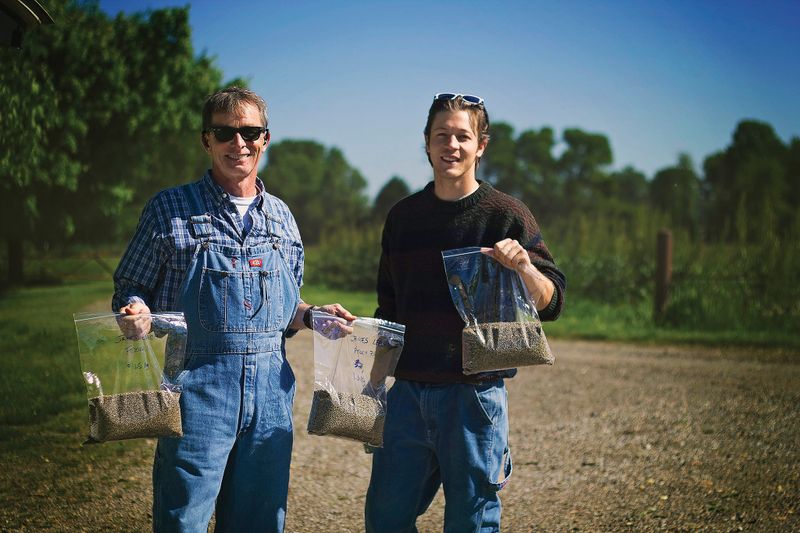Industrial hemp (Cannibis sativa), once an illegal substance thanks to its close
kinship to marijuana, has been fair game for research projects in conjunction with
state departments of agriculture since 2014. And last year, West Virginia University
researchers used the change in rules to purchase hemp seed and plant it at a campus
farm.
A HEMP PLANT GROWS IN WEST VIRGINIA (PHOTO COURTESY J. MORGAN LEACH).
Historically a staple in the manufacture of fibrous products like rope and clothing, hemp is used in oils for foods and toiletries and has newer uses in graphene for battery production and in building materials that are more eco-friendly than concrete. Hemp also takes toxins out of the soil and the air where it is grown, making its potential debut welcome in southern West Virginia where it could be used for strip mine reclamation as well as a cash crop.
Hemp and marijuana are outwardly identical twins, but differ in their tetrahydrocannabinol (THC) content, which produces the “high.” Industrial hemp has very little THC content, which did not prevent its inclusion in the 1937 federal law that made it illegal. The 2014 federal farm bill reversed hemp’s illegal status, but whether it is still a controlled substance remains a gray area. The farm bill also says no federal funds may be used to impede the transportation, processing or sale of hemp in the state where it is grown or in other states.
One WVU alumnus is advocating for hemp’s place among the state’s industries.
J. Morgan Leach, BS ’12, Journalism, JD ’16, is the executive director of the West Virginia Hemp Farmers Association. Leach, an attorney with a focus on energy and sustainable development, said the organization is working on economic diversification for the state through agriculture production.
 ALUMNI JIM LEACH AND J. MORGAN LEACH HOLD HEMP SEEDS FROM THE WEST VIRGINIA
DEPARTMENT OF AGRICULTURE (COURTESY PHOTO).
ALUMNI JIM LEACH AND J. MORGAN LEACH HOLD HEMP SEEDS FROM THE WEST VIRGINIA
DEPARTMENT OF AGRICULTURE (COURTESY PHOTO).
He notes that coal production continues to decline in West Virginia.
“People are looking for other sources of revenue,” Leach said. “Introducing another cash crop in the state couldn’t have come at a better time.”
But it’s not the kind of business that just crops up, and that’s where WVU comes in.
Research began this year at the Davis College of Agriculture, Natural Resources and Design in 32 plots with five varieties of hemp at the Organic Agriculture Farm. The first crop has been harvested, and researchers are cautiously optimistic that the study can continue in spite of two factors that present significant hurdles to statewide hemp production.
They have to first worry about cost. Seeds for the experimental hemp plots cost anywhere from $600 to $1,200, according to Louis McDonald, professor of environmental soil chemistry and soil fertility.
McDonald said the goal for the first year was just to show that the seeds could be obtained and grown, which could lead to more support for the research. Not expensive on their own, the seeds’ cost is inflated by the shipping fees from countries where the plant is grown commercially. Seed from Canada used in seed and seed oil production, and seeds from France for fiber production was ordered by the West Virginia Department of Agriculture and distributed to WVU and other certified growers across the state.
Initial indicators are that the crop “seems to grow reasonably well” in the state, McDonald said. Although researchers are still going through the data, McDonald said he believes hemp has potential as a cash crop in West Virginia.
“I think it’s worth exploring,” he said, noting that at a meeting with agronomists from other universities, he found that hemp research is ongoing. “It would be a shame if we weren’t also trying that.”
Graduate student Susanna Wheeler worked on the project.
“It was a success just getting seeds ordered for the first year and just getting some plots planted,” Wheeler said.
“Without a place to send it, no one is going to spend money on the seed,” McDonald noted. “The first step is to put together those facilities.”
“The investment we need is in the processing,” Leach agreed. “The most immediate source of revenue is hemp seed and hemp seed oil. We’re also working on the development of the fiber industry.”
Leach said his organization is working on constructing a processing facility in the state.
“We raised capital within our membership,” he said. “We really seek to work with government agencies to get grants from the [U.S. Department of Agriculture] and the State Department of Agriculture.
“I’m very optimistic. There’s a lot of potential in West Virginia to do this.”
